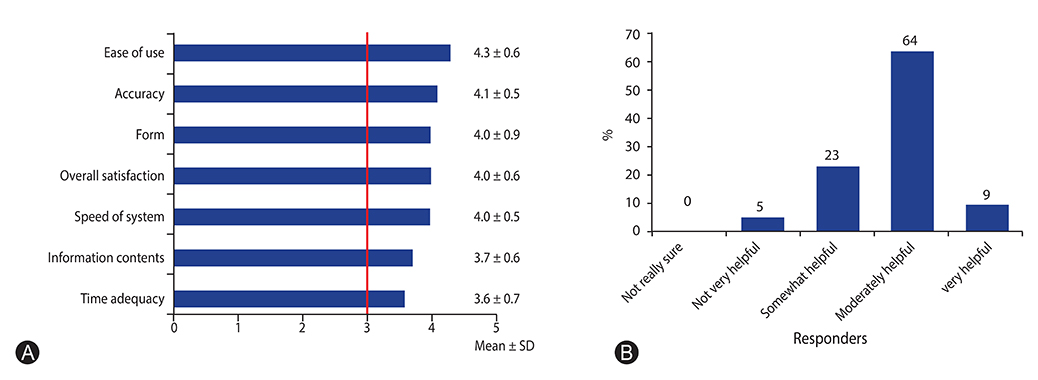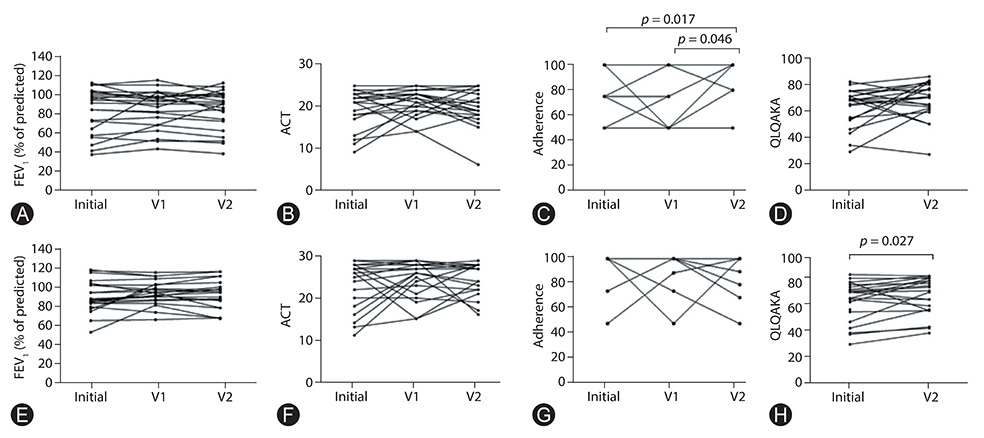Asia Pac Allergy.
2016 Jul;6(3):174-180. 10.5415/apallergy.2016.6.3.174.
Feasibility of a smartphone application based action plan and monitoring in asthma
- Affiliations
-
- 1Department of Internal Medicine, Inje University College of Medicine, Busan 47392, Korea.
- 2Institute of Allergy and Clinical Immunology, Seoul National University Medical Research Center, Seoul 03080, Korea. addchang@snu.ac.kr
- 3Department of Internal Medicine, Seoul National University Bundang Hospital, Seongnam 13620, Korea.
- 4Department of Internal Medicine, Pusan National University College of Medicine, Yangsan 50612, Korea.
- 5Department of Internal Medicine, Pusan National University Yangsan Hospital, Yangsan 50612, Korea.
- 6Department of Internal Medicine, Seoul National University College of Medicine, Seoul 03080, Korea.
- 7Technology Development Office, Advanced Institute of Technology, KT R&D center, Seoul 16678, Korea.
- KMID: 2400419
- DOI: http://doi.org/10.5415/apallergy.2016.6.3.174
Abstract
- BACKGROUND
Asthma patients may experience acute episodic exacerbation. The guidelines recommend that written action plan should be given to asthma patients. However, no one can predict when and where acute exacerbation will happen. As people carry smart phone almost anytime and anywhere, smartphone application could be a useful tool in asthma care. We evaluated the feasibility of the ubiquitous healthcare system of asthma care using a smartphone application (snuCare) based on the self-management guideline or action plan.
METHODS
Forty-four patients including fragile asthmatics were enrolled from Seoul National University Bundang Hospital between December 2011 and February 2012. They were randomly assigned into application user (n = 22) or application nonuser group (n = 22). We evaluated user-satisfaction, and clinical parameters such as asthma control, Quality of Life Questionnaire for Adult Korean Asthmatics, and the adherence of patients.
RESULTS
The characteristics were similar at baseline between the 2 groups except those who treated with short-term systemic steroid or increased dose of systemic steroid during previous 8 weeks (user vs. nonuser: 31.8% vs. 4.5%, p = 0.020). Total of 2,226 signals was generated during 8 weeks including 5 risky states. After eight weeks, the users answered that it was very easy to use the application, which was shown in highest scores in terms of satisfaction (mean ± standard deviation, 4.3 ± 0.56). Seventy-three percent of patients answered that the application was very useful for asthma care. User group showed improved the adherence scores (p = 0.017). One patient in application user group could avoid Emergency Department visit owing to the application while a patient in nonuser group visited Emergency Department.
CONCLUSION
The ubiquitous healthcare system using a smartphone application (snuCare) based on the self-management guideline or action plan could be helpful in the monitoring and the management of asthma.
MeSH Terms
Figure
Cited by 3 articles
-
Self-management of Chronic Conditions Using mHealth Interventions in Korea: A Systematic Review
Jae Yoon Yi, Yujin Kim, Yoon-Min Cho, Hongsoo Kim
Healthc Inform Res. 2018;24(3):187-197. doi: 10.4258/hir.2018.24.3.187.Advances in technology are changing the future of medicine
Yoon-Seok Chang
Asia Pac Allergy. 2016;6(3):137-138. doi: 10.5415/apallergy.2016.6.3.137.Effects of Education about Action Plans according to Self-Monitoring on Self-Management Adherence, Knowledge, Symptom Control, and Quality of Life among Adult Asthma Patients: A Randomized Controlled Trial
Ja Yun Choi, Young-Ran Kweon
J Korean Acad Nurs. 2017;47(5):613-623. doi: 10.4040/jkan.2017.47.5.613.
Reference
-
1. Bateman ED, Hurd SS, Barnes PJ, Bousquet J, Drazen JM, FitzGerald M, Gibson P, Ohta K, O'Byrne P, Pedersen SE, Pizzichini E, Sullivan SD, Wenzel SE, Zar HJ. Global strategy for asthma management and prevention: GINA executive summary. Eur Respir J. 2008; 31:143–178.
Article2. Levy ML, Thomas M, Small I, Pearce L, Pinnock H, Stephenson P. Summary of the 2008 BTS/SIGN British Guideline on the management of asthma. Prim Care Respir J. 2009; 18:Suppl 1. S1–S16.
Article3. Urbano FL. Review of the NAEPP 2007 expert panel report (EPR-3) on asthma diagnosis and treatment guidelines. J Manag Care Pharm. 2008; 14:41–49.
Article4. Gibson PG, Powell H, Coughlan J, Wilson AJ, Abramson M, Haywood P, Bauman A, Hensley MJ, Walters EH. Self-management education and regular practitioner review for adults with asthma. Cochrane Database Syst Rev. 2003; (1):CD001117.
Article5. Ring N, Jepson R, Hoskins G, Wilson C, Pinnock H, Sheikh A, Wyke S. Understanding what helps or hinders asthma action plan use: a systematic review and synthesis of the qualitative literature. Patient Educ Couns. 2011; 85:e131–e143.
Article6. Lee HR, Yoo SK, Jung SM, Kwon NY, Hong CS. A Web-based mobile asthma management system. J Telemed Telecare. 2005; 11:Suppl 1. 56–59.
Article7. Holtz B, Whitten P. Managing asthma with mobile phones: a feasibility study. Telemed J E Health. 2009; 15:907–909.
Article8. Marcano Belisario JS, Huckvale K, Greenfield G, Car J, Gunn LH. Smartphone and tablet self management apps for asthma. Cochrane Database Syst Rev. 2013; (11):CD010013.
Article9. Kwon HS, Lee SH, Yang MS, Lee SM, Kim SH, Kim DI, Sohn SW, Park CH, Park HW, Kim SS, Cho SH, Min KU, Kim YY, Chang YS. Correlation between the Korean version of Asthma Control Test and health-related quality of life in adult asthmatics. J Korean Med Sci. 2008; 23:621–627.
Article10. Park JW, Cho YS, Lee SY, Nahm DH, Kim YK, Kim DK, Sohn JW, Park JK, Jee YK, Cho YJ, Yoon HJ, Kim MK, Park HS, Choi BW, Choi IS, Park CS, Min KU, Moon HB, Park SH, Lee YK, Kim NS, Hong CS. Multi-center study for the utilization of quality of life questionnaire for adult Korean asthmatics (QLQAKA). J Asthma Allergy Clin Immunol. 2000; 20:467–480.11. The Korean Academy of Asthma, Allergy, and Clinical Immunology. Korean asthma management guideline. 2011 [Internet]. Seoul: The Korean Academy of Asthma, Allergy, and Clinical Immunology;c2005-2016. cited 2016 Feb 18. Available from http://www.allergy.or.kr/public/March_2011.pdf.12. Huckvale K, Car M, Morrison C, Car J. Apps for asthma self-management: a systematic assessment of content and tools. BMC Med. 2012; 10:144.
Article13. Licskai C, Sands TW, Ferrone M. Development and pilot testing of a mobile health solution for asthma self-management: asthma action plan smartphone application pilot study. Can Respir J. 2013; 20:301–306.
Article14. Cook KA, Modena BD, Simon RA. Improvement in asthma control using a minimally burdensome and proactive smartphone application. J Allergy Clin Immunol Pract. 2016; 4:730–737.e1.
Article15. Burbank AJ, Lewis SD, Hewes M, Schellhase DE, Rettiganti M, Hall-Barrow J, Bylander LA, Brown RH, Perry TT. Mobile-based asthma action plans for adolescents. J Asthma. 2015; 52:583–586.
Article
- Full Text Links
- Actions
-
Cited
- CITED
-
- Close
- Share
- Similar articles
-
- Development of a Smartphone Application Prototype for Child Obesity Prevention: Rationale and Study Design of Acceptability and Feasibility Tests
- Efficacy of the Smartphone-Based Glucose Management Application Stratified by User Satisfaction
- Predictors of Habitual and Addictive Smartphone Behavior in Problematic Smartphone Use
- Effects of a Smartphone Application on Breast Self-Examination: A Feasibility Study
- The Effect of Home-based Daily Journal Writing in Korean Adolescents with Smartphone Addiction




